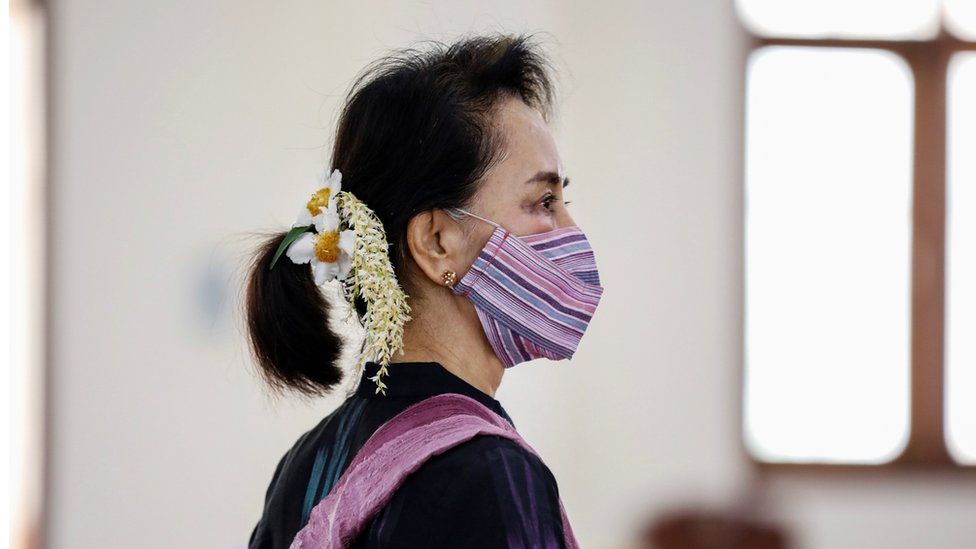Myanmar's military has taken control of the country after detaining de-facto leader Aung San Suu Kyi and other politicians in the early hours.
Military TV said a state of emergency had been declared for one year and power transferred.
The coup comes after tensions rose between the civilian government and the military following a disputed election.
Myanmar, also known as Burma, was ruled by the military until democratic reforms began in 2011.
The military said on Monday it was handing power to commander-in-chief Min Aung Hlaing because of "election fraud". Soldiers are on the streets of the capital, Nay Pyi Taw, and the main city, Yangon.
In November's election, Ms Suu Kyi's National League for Democracy (NLD) won enough seats to form a government.
What has the reaction been?
The United States has condemned the coup, saying Washington "opposes any attempt to alter the outcome of recent elections or impede Myanmar's democratic transition".
US Secretary of State Antony Blinken called for the release of all government officials and civil society leaders and said the US "stands with the people of Burma in their aspirations for democracy, freedom, peace, and development. The military must reverse these actions immediately".
Â
In Australia, Foreign Affairs Minister Marise Payne said "we call on the military to respect the rule of law, to resolve disputes through lawful mechanisms and to release immediately all civilian leaders and other who have been detained unlawfully."
line
'Myanmar on a perilous path'
Analysis box by Jonathan Head, BBC News
So it's official. The armed forces in Myanmar have confirmed that they have carried out a coup d'etat, their first against a civilian government since 1962, and in apparent violation of the constitution which the military promised to honour as recently as last Saturday.
The grievances which have been driving tension between the military and the government are well enough known. The military-backed party, the USDP, performed poorly in last November's general election, whereas the NLD did even better than in 2015.
The timing of this coup is also easily explained. This week the first session of parliament since the election was due to start, which would have enshrined the election result by approving the next government. That will no longer happen.
But the military's longer game plan is hard to fathom. What do they plan to do in the year they have given themselves to run the country? There will be public anger over a coup so soon after an election in which 70% of voters defied the Covid-19 pandemic to vote so overwhelmingly for Aung San Suu Kyi.
Famously stubborn, she is unlikely to co-operate with a gun held to her head. Her ally, President Win Myint, is the only person authorised under the constitution to enact a state of emergency. He has been detained with her.
For the moment the military's action appears reckless, and puts Myanmar on a perilous path.
line
What is the situation on the ground?
Mobile internet data connections and some phone services have been disrupted in major cities, while the state broadcaster MRTV says it is having technical issues and is off air.
Communications with Nay Pyi Taw are down and it is difficult to assess the situation there.
In the country's largest city and former capital Yangon, phone lines and internet connectivity appear to be limited, with many providers cutting their services.
BBC World News television, as well as other international broadcasters are blocked while local stations are off air.
People have been seen lining up at ATM's in Yangon amid expectations of a cash crunch in the coming days.
Banks have temporarily halted all financial services, according to the Bankers Association.
What happened in the election?
The NLD won 83% of available seats in the 8 November election in what many saw as a referendum on Ms Suu Kyi's civilian government.
It was just the second election since the end of military rule in 2011.
But the military has disputed the result, filing complaints at the Supreme Court against the president and the chair of the electoral commission.
Fears of a coup rose after the military recently threatened to "take action" over alleged fraud. The election commission has rejected the allegations.
Who is Aung San Suu Kyi?
Aung San Suu Kyi is the daughter of Myanmar's independence hero, General Aung San who was assassinated just before Myanmar gained independence from British colonial rule in 1948.
Ms Suu Kyi was once seen as a beacon for human rights - in 1991, she was awarded the Nobel Peace Prize, while still under house arrest, and hailed as "an outstanding example of the power of the powerless".
She spent nearly 15 years in detention between 1989 and 2010.
Â
In November 2015 she led the National League for Democracy (NLD) to a landslide victory in Myanmar's first openly contested election for 25 years.
The constitution forbids her from becoming president because she has children who are foreign nationals but the 75-year old, is widely seen as de facto leader.
In recent years, her leadership has been defined by the treatment of the country's mostly Muslim Rohingya minority.
In 2017 hundreds of thousands of Rohingya fled to neighbouring Bangladesh due to an army crackdown sparked by deadly attacks on police stations in Rakhine state.
Ms Suu Kyi's former international supporters accused her of doing nothing to stop rape, murder and possible genocide by refusing to condemn the military or acknowledge accounts of atrocities.
At home, however, "the Lady", as Ms Suu Kyi is known, remains wildly popular among the Buddhist majority who hold little sympathy for the Rohingya.
BBC





